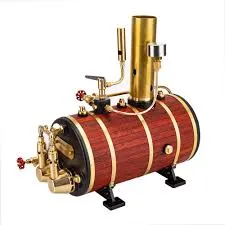
Sep . 15, 2024 23:21 Back to list
biomass fired steam boiler
Biomass-Fired Steam Boilers A Sustainable Energy Solution
In recent years, the importance of sustainability and renewable energy sources has come to the forefront of global energy discussions. Among various alternatives, biomass-fired steam boilers have emerged as a viable option for generating steam and heat while minimizing environmental impact.
Biomass energy refers to organic materials, such as wood, agricultural residues, and other biological waste, which can be converted into usable energy. Biomass-fired steam boilers utilize this organic matter as fuel, producing steam through a combustion process. This method not only helps in harnessing alternative energy sources but also contributes to waste management by utilizing materials that would otherwise contribute to landfill issues.
One of the primary advantages of biomass-fired steam boilers is their carbon-neutral nature. The combustion of biomass emits carbon dioxide, but this is offset by the fact that the biomass plants absorb carbon dioxide during their growth phase. Consequently, using biomass as an energy source contributes to a balanced carbon cycle, making it a more environmentally friendly option compared to fossil fuels.
Additionally, biomass boilers provide flexibility in fuel selection. They can utilize a variety of feedstocks, including wood chips, pellets, straw, and even certain types of waste. This adaptability can be appealing for industries looking to manage fuel costs effectively while also responding to local biomass availability. Furthermore, biomass fuels are often sourced locally, enhancing energy security and contributing to local economies.
biomass fired steam boiler

The efficiency of biomass-fired steam boilers has also improved significantly over recent years due to advancements in technology. Modern boilers are designed to achieve higher thermal efficiencies and lower emissions, ensuring that industries can comply with stringent environmental regulations while still operating effectively. Combined heat and power (CHP) systems, which generate electricity and useful heat simultaneously, further enhance the efficiency of biomass usage.
However, transitioning to biomass energy is not without challenges. The availability and cost of biomass fuel can fluctuate based on agricultural cycles, regulations, and market demands. Additionally, proper emissions control technologies are necessary to minimize particulate emissions and other pollutants that can arise from biomass combustion.
Nevertheless, the global push towards greener energy sources continues to drive interest in biomass-fired steam boilers. Industries such as food processing, paper manufacturing, and agriculture are increasingly recognizing the potential benefits associated with using renewable biomass fuels.
In conclusion, biomass-fired steam boilers represent a sustainable energy solution that aligns with global energy and environmental goals. By leveraging local resources, minimizing waste, and reducing carbon footprints, these boilers not only help industries meet their heat and energy needs but also contribute to a more sustainable future. As technology advances and adoption increases, biomass energy stands to play a significant role in achieving a cleaner, greener energy landscape.
-
High-Efficiency Commercial Oil Fired Steam Boiler for Industry
NewsJul.30,2025
-
High-Efficiency Biomass Fired Thermal Oil Boiler Solutions
NewsJul.30,2025
-
High Efficiency Gas Fired Thermal Oil Boiler for Industrial Heating
NewsJul.29,2025
-
High-Efficiency Gas Fired Hot Water Boiler for Sale – Reliable & Affordable
NewsJul.29,2025
-
High Efficiency Biomass Fired Hot Water Boiler for Industrial and Commercial Use
NewsJul.29,2025
-
High-Efficiency Biomass Fired Hot Water Boiler for Industrial Use
NewsJul.28,2025
Related PRODUCTS






















